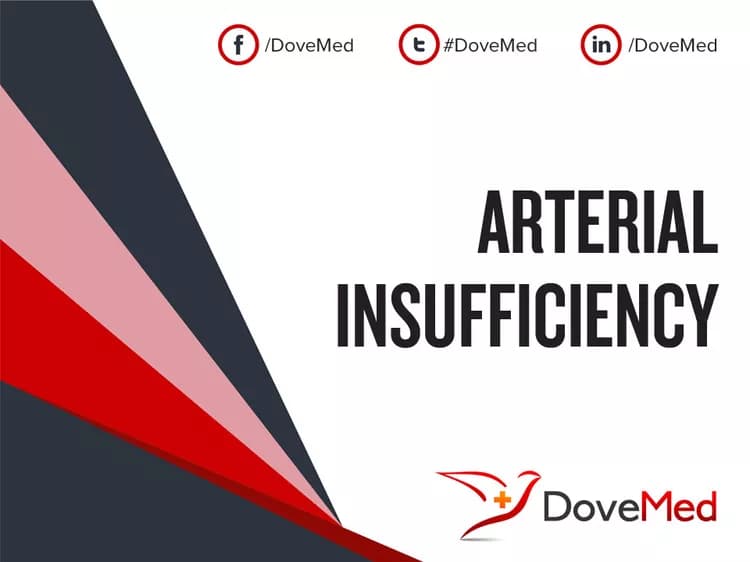What are the other Names for this Condition? (Also known as/Synonyms)
- Vertebrobasilar Arterial Insufficiency
- Vertebrobasilar Artery Syndrome
- Vertebrobasilar Insufficiency
What is Arterial Insufficiency? (Definition/Background Information)
- Arterial Insufficiency is a term used to describe a clinical condition, wherein the blood vessels carry decreased blood quantities, due to the narrowing of its lumen (inner passageway of the artery)
- The disorder can affect any part of the body, such as the heart, brain, or limbs
Who gets Arterial Insufficiency? (Age and Sex Distribution)
- Arterial Insufficiency occurs in adult individuals, who are above 50 years of age. The incidence increases as one grows older
- It is observed that males are affected more commonly than females
What are the Risk Factors for Arterial Insufficiency? (Predisposing Factors)
The risk factors of Arterial Insufficiency include the following:
- Atherosclerosis
- Smoking
- Excessive alcohol intake
- Overweight and obesity
- Diabetes
- Advancing age
It is important to note that having a risk factor does not mean that one will get the condition. A risk factor increases ones chances of getting a condition compared to an individual without the risk factors. Some risk factors are more important than others.
Also, not having a risk factor does not mean that an individual will not get the condition. It is always important to discuss the effect of risk factors with your healthcare provider.
What are the Causes of Arterial Insufficiency? (Etiology)
The most common cause for narrowing of the blood vessel lumen is atherosclerosis, which leads to the condition Arterial Insufficiency.
What are the Signs and Symptoms of Arterial Insufficiency?
Signs and symptoms vary according to the site of Arterial Insufficiency. The most common sites that results in symptoms include:
- Brain: It may result in a stroke and in this scenario, the accompanying signs and symptoms of a stroke occurs
- Heart: It may resulting in a heart attack and in this scenario, the signs and symptoms of heart attack is observed
- Legs: It may result in pain and cramping, while walking. A lack of blood supply can result in ulcers on the feet and legs. Other signs may include dry skin, thickened nails of the foot, etc.
- If the abdominal blood vessels are involved, it may result in abdominal pain (after eating a meal), termed as mesenteric artery ischemia
How is Arterial Insufficiency Diagnosed?
A diagnosis of Arterial Insufficiency would involve:
- Physical exam with evaluation of medical history
- Complete blood count
- Fasting blood glucose, to check for diabetes
- Lipid profile of the blood
- Radiological studies, such as contrast angiogram of the blood vessels that are involved, doppler studies to detect flow of blood, and other tests
- In case of brain symptoms: CT scan and MRI of the brain
- In case of heart symptoms: ECG of the heart, treadmill test for exercise tolerance, nuclear cardiac scans
Many clinical conditions may have similar signs and symptoms. Your healthcare provider may perform additional tests to rule out other clinical conditions to arrive at a definitive diagnosis.
What are the possible Complications of Arterial Insufficiency?
Depending on the site of Arterial Insufficiency, the complications vary. These include:
- In case of the brain: Stroke can lead to malfunction of brain, resulting in a variety of medical problems. Depending on the site of blood vessels involved, the symptoms include difficulty walking, talking, hearing, remembering, seeing, smelling, etc.
- In case of the heart: Arterial Insufficiency of the coronary arteries (coronary artery disease) resulting in a heart attack, can cause death of the heart muscles, arrhythmias, heart failure, etc.
- Extremities: Arterial insufficiency of the blood vessels of the limbs (peripheral artery disease) may result in difficulty walking, ulcers of the skin, gangrene of the toes, difficulty in lifting weights due to decreased muscle strength, etc.
- Atherosclerosis of the blood vessels can result in formation of blood clots, which can break-off, resulting in arterial embolism
How is Arterial Insufficiency Treated?
Treatment measures for Arterial Insufficiency include:
- Medications to dilate the blood vessels
- Lowering cholesterol through medications
- Treating and controlling diabetes
- Opening the blocked blood vessels using surgical procedures, such as stent placement
- Bypassing the blocked blood vessels, by using arterial bypass procedures.
- Appropriate weight control, avoiding obesity
- Cessation of smoking
- Adequate exercise, as prescribed by the physician
How can Arterial Insufficiency be Prevented?
Many of the methods to treat Arterial Insufficiency can also be utilized to prevent Arterial Insufficiency. These include:
- Lowering cholesterol through medications
- Treatment and control of diabetes
- Appropriate weight control
- Adequate exercise, as prescribed by the physician
- Cessation of smoking
What is the Prognosis of Arterial Insufficiency? (Outcomes/Resolutions)
- The prognosis depends on the site of Arterial Insufficiency
- With respect to the brain and heart, this condition can result in stroke or heart attack with serious consequences, including permanent damage to the organ tissues and even death
- An early diagnosis and appropriate treatment of Arterial Insufficiency yields an excellent prognosis
Additional and Relevant Useful Information for Arterial Insufficiency:
Sometimes, due to various lifestyle and/or genetic factors, the arteries become hard and clogged with a wax-like substance, composed of fat and other materials, called plaque. This is termed as atherosclerosis. This buildup of plaque, which can occur in any artery, obstructs the free flow of blood to various body regions, leading to major medical complications, including death.
Related Articles
Test Your Knowledge
Asked by users
Related Centers
Related Specialties
Related Physicians
Related Procedures
Related Resources
Join DoveHubs
and connect with fellow professionals


0 Comments
Please log in to post a comment.